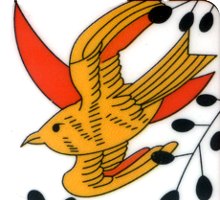Korean Hwatu
Hwatu (화투) cards originally came about because gambling with four-suited decks was outlawed. This ban prompted the creation of new decks and a new game.

‘Royal Gold’ Korean Hwatu
Hwatu cards are the Korean version of Japanese Flower Cards. “Hwatu” literally means “flower cards”. There are 48 cards in the game, broken up into twelve months (suits) of four cards each. Each month has a corresponding plant which is represented on the card. The cards are printed on thick, red plastic. Some of the cards have the word "光" (‘bright’) used to identify high scoring cards, a feature absent in the Japanese version. Hwatu is very commonly played in South Korea. ‘Go Stop’ is a popular card game played in Korea using “Hwatu” (화투) cards. The goal of the game is to gain as many points as possible, with certain combinations netting more points than others.
See also: another version of Hwatu Cards • Diamond brand Hwatu • Waddamda Hwatu

Above: 'New Royal Gold' Hwatu cards made in Korea, 2012. There are twelve suits, representing months. Each is designated a flower, and each suit has four cards. Typically, each suit will have two normal cards and one special card. A deck of Korean Hwatu cards usually includes bonus cards; these are shown in the bottom row.

By Simon Wintle
Member since February 01, 1996
I am the founder of The World of Playing Cards (est. 1996), a website dedicated to the history, artistry and cultural significance of playing cards and tarot. Over the years I have researched various areas of the subject, acquired and traded collections and contributed as a committee member of the IPCS and graphics editor of The Playing-Card journal. Having lived in Chile, England, Wales, and now Spain, these experiences have shaped my work and passion for playing cards. Amongst my achievements is producing a limited-edition replica of a 17th-century English pack using woodblocks and stencils—a labour of love. Today, the World of Playing Cards is a global collaborative project, with my son Adam serving as the technical driving force behind its development. His innovative efforts have helped shape the site into the thriving hub it is today. You are warmly invited to become a contributor and share your enthusiasm.
Related Articles

Seoul Tower Hwatu
This special ‘Hwatu’ card set has all the traditional 48 flower cards given a modern graphic treatme...

Girls’ Generation
“Girls’ Generation” (Korean: 소녀시대; Sonyeo Shidae) is a nine-member South Korean pop girl group forme...

Adventures in Korea
Each card has a colour drawing of a Korean building, museum or tourist attraction with a brief descr...

Korean Hwatu
Hwatu (화투) cards originally came about because gambling with four-suited decks was outlawed. This ba...

Hwatu
Hwatu - Korean Flower Cards. The cards are printed on thick, red plastic, instead of the laminated b...

Korea
The game of Hanafunda was introduced into Korea by the Japanese and modified somewhat by the Koreans...
Most Popular
Our top articles from the past 28 days

